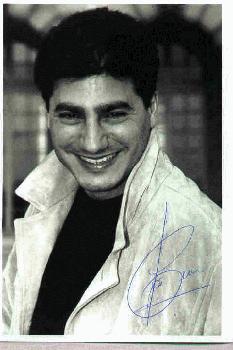|
 |
For a short while, Cura sang comprimario parts (for instance Remendado in Genova), but in 1993, he got his first leading role
in La signorina Julie by Antonio Bibalo in Trieste. In 1994, he was again in Genova, plus in Torino and Martina Franca,
and he won Plácido Domingo's Operalia competition in September.
Now he made a large-scale career, with debuts in: Chicago in late 1994; Palermo (Politeama), Opéra Bastille, Covent
Garden and Torre del Lago in 1995; Rome, Zürich, Ravenna Festival, Amsterdam, Los Angeles and San Francisco in 1996; in
1997, La Scala, Bologna, Vienna Staatsoper, Arena di Verona; 1998, Tokyo, Palermo (Teatro Massimo), Marseille, Washington;
1999, Metropolitan Opera, Teatro Real in Madrid; 2000, Munich; 2001, Théâtre du Châtelet in Paris, Teatre
del Liceu in Barcelona; 2002, Warsaw; 2003, Hamburg, Maggio musicale fiorentino; 2004, Seoul; 2005, Deutsche Oper Berlin,
Piacenza; 2007, Mannheim, Buenos Aires (Teatro Colón), Bucharest, Cologne; 2008, San Diego, Szeged, Hannover,
Karlsruhe, Tenerife; 2009, Wiesbaden, Liège; 2012, Bratislava, Luxembourg, Stockholm, Český Krumlov;
2013, Catania, Monte Carlo; 2014, Budapest, Bonn, Lübeck; 2015, Prague, Beijing; 2016, Salzburg Easter Festival,
Ljubljana, Dresden; 2018, St. Petersburg. To most of these theaters, he returned time and again, for instance to La Scala,
the Met, Chicago, Arena di Verona, Paris, Barcelona, Bratislava, Palermo, Hannover; but the centers of his career were Torino
(where he sang his first Otello as early as 2007), the Vienna Staatoper, Covent Garden, Zürich, the Deutsche Oper Berlin,
and in his later years Buenos Aires and Liège.
The quality of his singing was never up to his success; when young, he was certainly not unpleasant to listen to – on
recordings (cf. below, "Ah sì, ben mio" and "Come un bel dì di maggio"), because in the theater, his voice was
too small and not resonant enough to impress. As soon as it grew, he already produced the vulgar, rattling sound that you can
admire below in "Di quella pira" or the Samson excerpt.
His repertory was primarily dramatic; Otello and Samson were his signature roles, plus he sang Radamès, Chénier, Canio,
Alvaro, Don Carlo, Don José, Jean (Hérodiade), Turiddu, Puccini's des Grieux, Dick Johnson, Calaf, Loris,
Pollione, Peter Grimes, even Tannhäuser; but also Cavaradossi, Alfredo or Roberto (Le villi), and very strangely,
his first Rodolfo as late as 2010 (in Zürich).
In the 2000s, he increasingly emerged as a conductor (his original career aspiration), both in opera and in concert. From 2007,
he also worked as a stage director. His tenor performances became few and far between after 2018.
Reference: Cura's website
Cura studied composition, conducting and piano in his native Rosario, and eventually also singing, which he trained first
on a six-month grant at the Teatro Colón in Buenos Aires in 1983; dissatisfied with the results, he focused entirely on
conducting, and only resumed work on his voice in 1988, first in Argentina with a private teacher, and from 1991 in Italy with
Vittorio Terranova. In 1992, he made his debut at the Teatro Filarmonico
in Verona, as the Father in Hans Werner Henze's children's opera Pollicino.
|
Today, (17 February 2008), we had a remarkable Pagliacci performance at the Wiener Staatsoper – remarkable, but not
exactly good. Cura sang Canio, and much to the surprise of the more knowledgeable part of the audience (the others didn't
of course realize anything), he also sang the Prologue instead of old, tired company pillar Georg Tichy (who
stepped in for equally old and tired Leo Nucci). Cura's remarkably intelligent rendition notwithstanding,
it was vocally inferior, not because it was too low for his voice (the low register is quite good) – but because
it was TOO HIGH for him. He was heavily booed. (Here you'll find
he recording of that Prologue rendition.) Turiddu was Peter Seiffert, and though his voice IS a wreck, he was much better than expected. He still produces, much the opposite of Cura, a stunningly beautiful sound, and as long as the top register is not too heavily involved, he still commands the art of being loud with a rather small voice but without forcing it. And to my big surprise, his Italian is actually good as far as both pronounciation and musical style. On the other hand, it's a pity to hear how he has ruined his voice – to the extent of being totally exhausted BEFORE this very short role ends, the voice cracking every now and then from "Viva il vino" onwards, and with a terrible wobble in the upper register. (Excerpts can be heard on the page dedicated to Seiffert.)
Ho-yoon Chung was Beppe. Definitely unremarkable. Nice timbre, but seems trying hard to sound like Carreras, imitating all his
faults. |
| José Cura sings | Il trovatore: Ah sì, ben mio |
| José Cura sings | Il trovatore: Di quella pira |
| José Cura sings | Turandot: Nessun dorma |
| José Cura sings | Samson et Dalila: Vois ma misère, hélas |
| José Cura sings | Andrea Chénier: Come un bel dì di maggio |
I wish to thank Thomas Silverbörg for the recordings (Chénier, Samson).
I wish to thank Roberto Falcone for the recording (Ah sì ben mio) and the picture.
I wish to thank André Wium for the recording (Turandot).